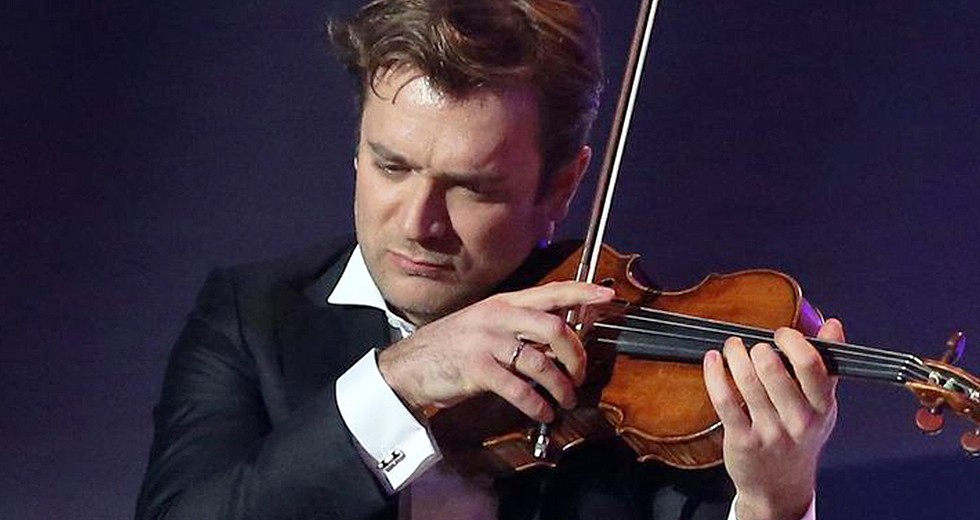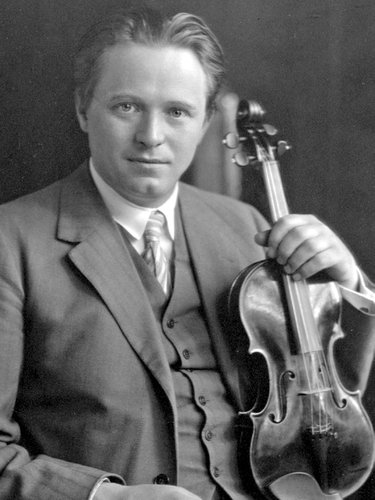
Many soloists may claim to value chamber music, but French violinist Renaud Capuçon has made it an integral part of his career. “It’s more than important, it’s kind of bread and water for me,” said Capuçon, who will appear Oct. 8, 9 and 13 with the Chicago Symphony Orchestra. “Chamber music is a way to connect with musicians, it’s a way to learn.”
Capuçon’s ample discography includes for example, “Fauré: Complete Chamber Music for Strings” (2011) and “Brahms: Piano Quartets” (2008), both of which also feature his younger brother, Gautier, a well-regarded cellist and frequent collaborator. In addition, he recently founded a string quartet, joining forces with violinist Guillaume Chilemme, violist Adrien La Marca and cellist Edgar Moreau. The Renaud Capuçon Quartet is making its first significant appearances this season, with concerts in several major European venues (none so far in the United States) such as Amsterdam’s Concertgebouw and Vienna’s Musikverein.

German violinist Adolf Busch (1891-1951) is the subject of a six-concert homage over three seasons by Renaud Capuçon.
On Jan. 19 at the Philharmonie de Paris, the ensemble will launch a six-concert homage across three seasons to German violinist Adolf Busch (1891-1951). A noted soloist, he led the famed Busch Quartet and was one of the co-founders of the Marlboro Music School and Festival in Vermont. The project, which Capuçon said also will be presented at Wigmore Hall in London, is meant to showcase different aspects of Busch’s musical personality and tastes.
While the violinist’s chamber pursuits might seem to have little to do with his concertizing with orchestras, Capuçon believes the two are actually inextricably intertwined. He tries to bring the collaborative intimacy of a small ensemble to his larger-scale orchestra performances. “When I play concertos,” he said, “I wouldn’t play the same if I didn’t play chamber music. When you’re in a string quartet or piano trio, your musical partner is at most one meter away, and you tell him something and you give him something and then he gives you back something. It’s a perfect way to communicate, to speak. When you with play the Brahms Concerto with an orchestra, you have a bit more than two people playing with you, but I play it with the same spirit.”
Listeners will have an opportunity to hear this chamber-music approach in action when he performs Brahms’ Violin Concerto in D Major, Op. 77, with the CSO and guest conductor Semyon Bychkov, a regular at Symphony Center. “We have known each other a long time,” Capuçon said of the Russian-born maestro. “I’ve played a lot of different pieces with him, and he’s a wonderful musician. He’s a very close friend.”
Now 39, the violinist has felt an affinity for the music of Brahms his entire life. His discography features recordings of the composer’s piano trios, piano quintets and violin sonatas. When he was 12, he eagerly learned one of the sonatas over the objections of his teacher who told him he was too young. “From my early years, he was always a composer I dreamed of playing,” Capuçon said. “I’m love with this composer. It’s a very human feeling. When you hear Brahms or you play Brahms, you feel better. I don’t how to express it. It’s something that nourishes you. There is a lot of tenderness in his music. It could be just academic but it’s not.”
Capuçon expressed particular admiration for the CSO’s noted 1986 recording of the Brahms Violin Concerto with soloist Itzhak Perlman and conductor Carlo Maria Giulini. “It’s one of the most amazing recordings of the piece, so I’m absolutely excited and honored to play this piece with the orchestra,” Capuçon said. He released his own version of the concerto in 2012 on an album with conductor Daniel Harding and the Vienna Philharmonic — one that also featured Alban Berg’s famed work in the same form. “When you record something, you take a picture of the moment,” he said. “Of course, if I were to record it again today, it would be completely different. It would still be me, but a lot of things, I hope, would be better.”
Kyle MacMillan, former classical music critic of the Denver Post, is a Chicago-based arts writer.